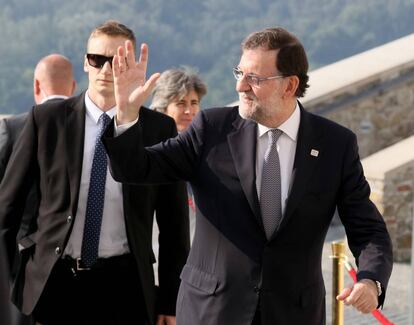Spain becoming an international lame duck, warns report
Foreign Ministry notes that political stalemate is keeping Madrid on the sidelines of world gatherings

The United States and China recently announced their decision to ratify the Paris agreement on climate change. The document will go into effect when 55 countries do the same, but it will be difficult for Spain to be one of these nations.
All of Spain’s political parties agree that the country should be on that list, but the initiative has yet to be put before Congress. That is because Spain has been under a caretaker government since late last year, when an inconclusive general election was followed by months of fruitless negotiations, then another election and more fruitless talks to form a government.
Who is going to ally themselves with a caretaker government that cannot promise anything?
Foreign Ministry report
The climate change treaty is just one of more than 40 international agreements pending ratification by the Spanish parliament.
There is also the Asian Infrastructure Investment Bank (AIIB), the extension to the lease on NASA’s Deep Space Communications Station in Robledo de Chavela, the new Social Security agreement with the United States, a series of airspace deals with India, Mexico and Uzbekistan, and dual taxation covenants with Mexico, Finland and Qatar.
Other issues will not even reach the floor of Congress for approval because they are still at too early a stage of negotiations, and Spanish legislators cannot move forward until a new government has been formed.
These include the cleanup of the land that was contaminated in the nuclear accident over Palomares (Almería) in 1966, the creation in Rota (Cádiz) of a helicopter airbase for US narcotics and law enforcement operations, and cooperation with India on peaceful uses for nuclear energy.

“The continuity of the caretaker government [for nine months now] is having increasingly serious consequences for Spain’s international projection, derived from an institutional deadlock that makes our country look like a permanent lame duck,” warns a report by the Spanish Foreign Affairs Ministry, to which EL PAÍS has had access.
“The limits on diplomatic action, the loss of profile and influence, and the slowdown in decision-making all have negative consequences for our international prestige, as well as direct material costs,” adds the report. “And, as a medium-size power, the spaces that Spain leaves open are being quickly filled by other competing countries.”
The cost of non-government
The foreign affairs report, titled “The cost of non-government,” illustrates its point with numerous examples of lost opportunities due to the absence of a fully functional executive.
King Felipe VI has had to postpone or cancel trips to Saudi Arabia, Morocco, Japan and South Korea, while dignitaries from Argentina and Israel have placed their visits to Spain on hold.
Regular summits with countries such as Mexico, Turkey or Algeria are no longer taking place, and there have been no recent bilateral meetings with European partners such as France, Italy, Germany or Portugal.
As a medium-size power, the spaces that Spain leaves open are being quickly filled by other competing countries
Foreign ministry report
“We are being progressively excluded from the centers of power where all the great decisions are made,” warns the report. “The gatherings of European and international leaders continue to take place even as the members of the Spanish government are kept on the sidelines because they are unable to make the commitments that need to be made.”
According to the Foreign Ministry, this also explains why acting Prime Minister Mariano Rajoy was absent from two summits held by France, Germany and Italy “who have formed a core group to guide the future of the EU” following the Brexit vote in Britain.
And it is not just at the highest diplomatic level that Spain is losing prominence. Spanish ambassadors are gradually being received less frequently by foreign ministries, or received by lower-ranking officials. “This has a direct impact on issues of national interest such as government procurement: other competitors with support from their own diplomatic personnel have an edge over us,” says the Foreign Ministry.
In Canada, Spanish firms are competing for an infrastructure program worth $60 billion; in Australia, Navantia is hoping to sell the government frigates; and in Iran, the nuclear agreement has set off a battle between Western companies to claim a stake in a market that had been off limits until recently.
The report does not offer an estimate of the cost of this “non-government,” but says that Spain could face sanctions due to its inability to meet EU deadlines on a number of issues.
The lack of a fully functional government also means that Spain cannot release funds it had pledged for international aid, such as the €7 million that were earmarked for Syria.
“In international politics, lost opportunities do not come back,” warns a seasoned diplomat. Spain needs allies to become host to some of the EU agencies that will leave their current British headquarters, and to earn a seat on the UN Human Rights Committee.
But, as the document notes: “Who is going to ally themselves with a caretaker government that cannot promise anything?”
English version by Susana Urra.
Tu suscripción se está usando en otro dispositivo
¿Quieres añadir otro usuario a tu suscripción?
Si continúas leyendo en este dispositivo, no se podrá leer en el otro.
FlechaTu suscripción se está usando en otro dispositivo y solo puedes acceder a EL PAÍS desde un dispositivo a la vez.
Si quieres compartir tu cuenta, cambia tu suscripción a la modalidad Premium, así podrás añadir otro usuario. Cada uno accederá con su propia cuenta de email, lo que os permitirá personalizar vuestra experiencia en EL PAÍS.
¿Tienes una suscripción de empresa? Accede aquí para contratar más cuentas.
En el caso de no saber quién está usando tu cuenta, te recomendamos cambiar tu contraseña aquí.
Si decides continuar compartiendo tu cuenta, este mensaje se mostrará en tu dispositivo y en el de la otra persona que está usando tu cuenta de forma indefinida, afectando a tu experiencia de lectura. Puedes consultar aquí los términos y condiciones de la suscripción digital.









































